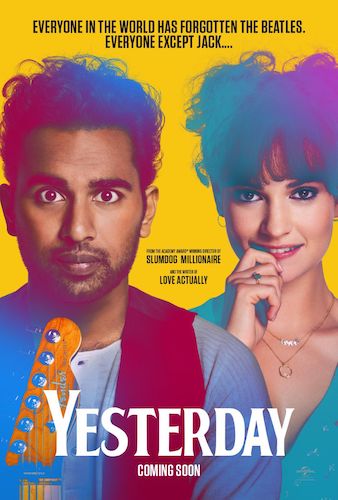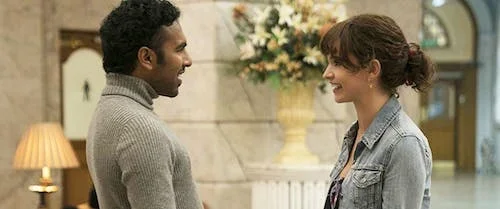Yesterday
If you ever want to know what a tug-of-war in cinema feels like, Yesterday is an excellent example. As a major Danny Boyle fan myself, you can sense the trademarks of the individualist (as I did). The colour palettes, uses of text on screen, and other odd ball moves are definitely of his palette. For fans of writer Richard Curtis, you can feel the rom-com sensibilities really take a precedent with the film’s direction. Ambitious yet mainstream directing. Familiar romantic comedy writing. Yesterday feels like a battle between Paul McCartney’s mind and John Lennon’s heart. The difference is, you never felt the divide during their songs. Sure, you may know the songs McCartney did himself, or the tunes Lennon recorded without McCartney, but the song never feels anything less than whole.
The possibilities of Yesterday are limitless, until they reach Curtis’s intention for the story. When do we get reminded of this true purpose? Almost the entire film. See, this is not an experiment to see what a world without the music of The Beatles is really like. It’s the rediscovery of love through the songs of The Beatles. That’s all well and good, but both threads suffer. Jack Malick has been managed by his friend Ellie for many years. She does it out of her love for him: she is both in love, and also wanting to see her close friend do well. This is one of those rom-coms where “we didn’t see it until it hits us!”, so naturally the majority of the film is Jack’s sprint back to right his mistakes with her. The main issue is that this film also falls into the “I know you’re trying to say you love me, but it’s not convenient for the story, so I’m going to move on” trap. If the focus of the film is on their love for one another, why does Yesterday not allow that to come to fruition the right way?
Jack and Ellie reuniting after his big break.
Then, there is the Beatles side of things, and all of our worries came true. The film doesn’t explore a world without the influence of the Beatles, as we all predicted. It instead just imagines they flat out stopped existing. This would make sense if they always existed, and everyone’s minds forgot about them. They would just have to be reminded. But this is not the case. Without giving too much away, you see some instances of this reality’s "end results. This is a world literally without the band The Beatles having ever existed. It. Makes. No. Sense. How could Ed Sheeran and Coldplay (two artists that are mentioned, or even shown in Sheeran’s case) exist without the pop formulas taken from The Beatles? The film makes a jab at indie rock group Neutral Milk Hotel (they’re legitimately a spectacular band, please check them out), yet this is another band that likely was influenced by the fab four. Bands like The Rolling Stones still exist in this universe. Do the albums they made to rival The Beatles still exist? How does this even work? It just does not make sense that we would arrive at this very point with everything being the exact same, except for the fact that The Beatles don’t exist anymore.
Well, that’s also not entirely true. Other things have disappeared for no rhyme or reason, too. Coca-Cola no longer exists (they make fun of Pepsi during this, but I prefer Pepsi anyway. Yes. We exist.). Harry Potter no longer exists. Yet, this next example is the most peculiar. The band Oasis no longer exists. Jack remarks “naturally”. Why naturally? Why is this natural? If Coldplay being influenced by The Beatles does not result in their absence from the world, why does the absence of Oasis make sense? The bigger question is: why is Oasis gone, and not a, b, c, d, e, f, and the rest of the entire alphabet of bands directly influenced by the group? No artists take any places for the absentees. No voids are filled. Things just disappeared, and that’s that. Without spoiling the ending too much, I also don’t understand how an idea flat out does not exist, but people still do. I understand the suspension of disbelief in films that toy with realities like this. However, there is absolutely zero cohesiveness. Unless I’m missing something (and IMDb trivia will inform me otherwise), there is zero correlation to the things that disappeared. The actual phenomenon is not explored enough (it’s likened to Y2K, but that’s about it). Avoiding spoilers once more, we see glimpses of an even bigger story, yet the joy of The Beatles’ music existing once more is enough. It actually isn’t enough. Danny Boyle usually explores all odds at such great lengths. Yesterday is the very rare time he dips his toes in the water, yet never fully dives in.
Jack being lauded by executives and label extraordinares.
What saves the film from being a complete disaster, is the assuredness Yesterday has in its few matching elements. Curtis knows Boyle was wanting to explore an existential foreverness, so there are glimpses of the fantastical premise found within the writing. Boyle knows Curtis loves to speak from the heart, so his direction of the more sentimental scenes still pierce you. The film’s lighter tone also helps the many plot holes and missed opportunities zip past you. You won’t forget them, but you won’t be bogged down by them, either.
At the end of the day, this was Curtis trying to tell a musical romance story, and Boyle trying to break brains once again. Yesterday is the middle section of a Venn diagram featuring both filmmakers as two separate circles. The magic found in the middle portion is just enough. It also doesn’t hurt that the film is stuffed with Beatles songs (covers by Himesh Patel, of course). A scene that sticks out is a slight turn of events towards the end of the film (featuring a brilliant cameo by Boyle alumni Robert Carlyle). It’s a slight look at what could have been that still doesn’t quite make sense in the film’s premise, yet you will likely be moved greatly nonetheless; it also works as a scenario many of us wish we could have.
If you love Danny Boyle’s films, Yesterday is worth it because of the liberties he takes as a director here (and it’s nice to see what perspective he will give this time around). If you love Richard Curtis’s writing, give Yesterday a shot, because the best intentions are there, and you will swoon. If you love The Beatles, then Yesterday might be for you, because — as we have learned over fifty years later — you can never run out of ways to celebrate their music. If none of the above apply to you, Yesterday may be a confused mess of a hypothesis. If at least one of the above applies to you, Yesterday is a flawed — yet earnest — effort that might at least put you in a good mood for a little bit.
Andreas Babiolakis has a Masters degree in Film and Photography Preservation and Collections management from Ryerson University, as well as a Bachelors degree in Cinema Studies from York University. His favourite times of year are the Criterion Collection flash sales and the annual Toronto International Film Festival.






